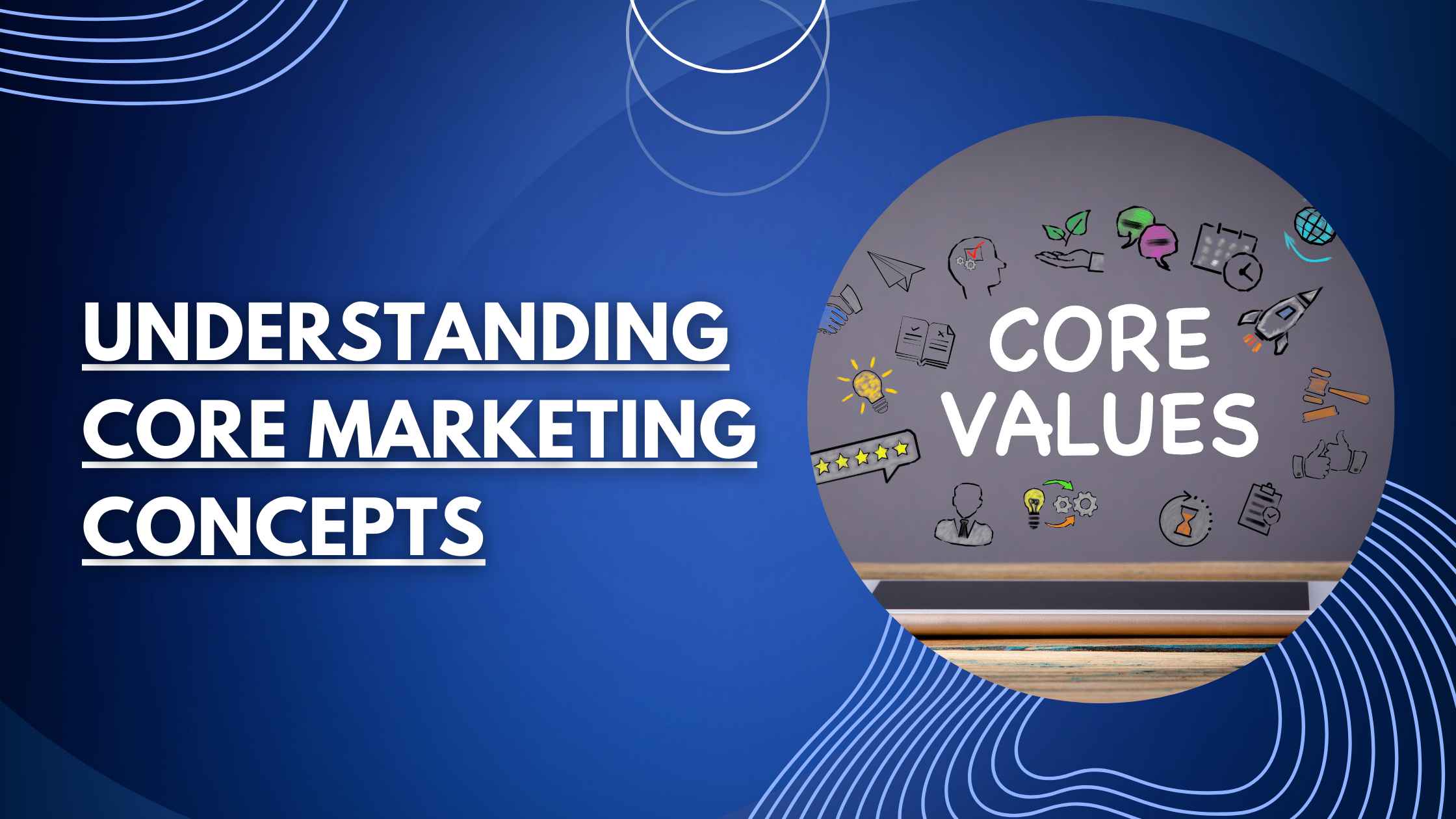
“Demystifying Marketing: Understanding Core Marketing Concepts”
Introduction :
Marketing is the heartbeat of every successful business. It’s the art and science of promoting products or services to potential customers. Whether you’re a seasoned marketer or just starting to explore the world of business, understanding core marketing concepts is essential. In this blog, we will delve into these fundamental principles that serve as the foundation for effective marketing strategies. Let’s demystify marketing and equip you with the knowledge to navigate this dynamic field.
1. Market Segmentation
Market segmentation involves dividing a broad market into smaller, more manageable segments based on common characteristics, such as demographics, psychographics, or behavior. This concept allows businesses to tailor their marketing efforts to specific groups, ensuring that their products or services resonate with the right audience. By understanding their target market’s unique needs and preferences, businesses can craft more compelling messages and create personalized experiences.
Your target audience represents the group of people most likely to buy your product or service. Identifying and understanding your target audience is crucial for effective marketing. It involves researching their demographics, interests, behaviors, and pain points. With this knowledge, you can create marketing campaigns that speak directly to their needs and desires, increasing the likelihood of conversion.
2. Target Audience
Your target audience represents the group of people most likely to buy your product or service. Identifying and understanding your target audience is crucial for effective marketing. It involves researching their demographics, interests, behaviors, and pain points. With this knowledge, you can create marketing campaigns that speak directly to their needs and desires, increasing the likelihood of conversion.
3. Marketing Mix (4Ps) :
The marketing mix, often referred to as the 4Ps, comprises four essential elements: Product, Price, Place, and Promotion. These elements work together to create a comprehensive marketing strategy.
Product: This refers to the actual product or service you offer. It involves product design, features, quality, and branding.
Price: Determining the right price for your product is crucial. It should consider production costs, competition, and perceived value by the customer.
Place: This pertains to the distribution channels through which customers can access your product. It involves decisions about where and how to sell your offering.
Promotion: Promotion includes all the activities and strategies used to market your product. It encompasses advertising, public relations, sales promotions, and more.
4. Branding:
A brand is more than just a logo or a name; it’s the perception people have of your company and its products or services. Effective branding creates a unique identity and builds trust and loyalty among customers. It involves establishing a consistent visual and emotional connection with your target audience, telling a compelling brand story, and delivering on promises to maintain a positive brand image.
5. Customer Journey:
The customer journey is the process that customers go through from the moment they become aware of your brand to the point of making a purchase and beyond. Understanding this journey helps you map out touchpoints and create marketing strategies tailored to each stage. It’s crucial to provide a seamless and satisfying experience throughout the entire journey to retain and delight customers.
6. Marketing Research:
Marketing research involves gathering and analyzing data to make informed decisions. It helps businesses understand market trends, customer preferences, and competitive landscapes. Through techniques like surveys, focus groups, and data analysis, marketing research provides valuable insights that drive strategic planning and marketing campaigns.
7. Digital Marketing
In today’s digital age, online presence is paramount. Digital marketing encompasses a wide range of strategies, including search engine optimization (SEO), social media marketing, email marketing, content marketing, and pay-per-click (PPC) advertising. These tools enable businesses to reach a global audience, engage with customers in real-time, and track campaign performance with data analytics.
8. Marketing Metrics
Measuring the effectiveness of marketing efforts is essential for continuous improvement. Marketing metrics allow you to track key performance indicators (KPIs) such as conversion rates, click-through rates (CTR), return on investment (ROI), and customer acquisition cost (CAC). By analyzing these metrics, you can refine your strategies and allocate resources more effectively.
9. Competitive Analysis
Understanding your competition is critical for staying ahead in the market. Conducting competitive analysis helps you identify your rivals’ strengths and weaknesses, as well as opportunities and threats in the market. This knowledge enables you to differentiate your products or services and position your brand effectively.
10. Content Marketing
Content marketing is a powerful strategy that involves creating and distributing valuable, relevant, and consistent content to attract and engage a target audience. This content can take various forms, including blog posts, videos, infographics, and podcasts. Content marketing not only educates and entertains but also establishes your authority in your industry and builds trust with your audience. It’s a long-term approach that focuses on providing value to potential customers rather than direct selling.
11. Customer Relationship Management (CRM)
Managing and nurturing relationships with your customers is essential for long-term success. CRM systems help businesses organize customer data, track interactions, and personalize communication. By understanding your customers’ needs and preferences, you can tailor your marketing efforts, provide better customer service, and foster loyalty.
12. Ethics and Social Responsibility
In today’s socially conscious world, ethical marketing and corporate social responsibility (CSR) are gaining prominence. Consumers increasingly expect businesses to be socially responsible and to act in an ethical manner. Marketing campaigns should align with ethical values, and businesses should contribute positively to their communities and the environment. Ethical marketing not only enhances brand reputation but also connects with socially conscious consumers.
13. A/B Testing and Optimization
A/B testing involves comparing two or more versions of a marketing element (such as an email subject line, webpage layout, or ad copy) to determine which performs better. Through iterative testing and optimization, you can fine-tune your marketing strategies for improved results. This data-driven approach allows you to make informed decisions and continually improve your campaigns.
14. Return on Investment (ROI)
ROI measures the profitability of your marketing efforts by comparing the cost of marketing campaigns to the revenue generated. Understanding ROI is crucial for allocating resources effectively and assessing the success of marketing initiatives. Calculating ROI helps you prioritize strategies that provide the best return on your investment, ultimately leading to improved profitability.
15. Global Marketing
In an interconnected world, businesses often need to expand their reach beyond domestic markets. Global marketing involves adapting marketing strategies to different cultures, languages, and market conditions. It requires a deep understanding of international markets, regulatory requirements, and localization of content to effectively reach and engage a global audience.
16. Crisis Management
No matter how well you plan, unexpected crises can occur. Marketing professionals should be prepared to handle crises that may damage a brand’s reputation. Effective crisis management involves swift communication, transparency, and taking appropriate actions to mitigate the impact. It’s a critical aspect of modern marketing, where news and information spread rapidly through social media and other channels.
Conclusion
In the ever-evolving landscape of marketing, staying abreast of these core concepts is essential for success. From understanding your audience and mastering digital tools to embracing ethical practices and adapting to global markets, these concepts provide a comprehensive framework for building and sustaining a successful marketing strategy.
Remember that successful marketing isn’t just about applying these concepts individually; it’s about combining and tailoring them to your specific business and industry. Continual learning and adaptation are key in the world of marketing, where trends, technologies, and consumer behaviors are in constant flux. As you integrate these core marketing concepts into your strategies, you’ll be better equipped to navigate the challenges and opportunities that lie ahead in the dynamic field of marketing.


